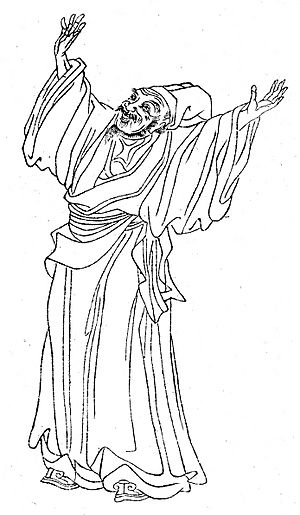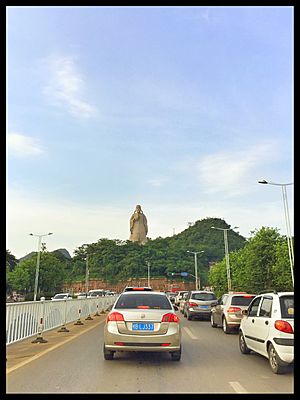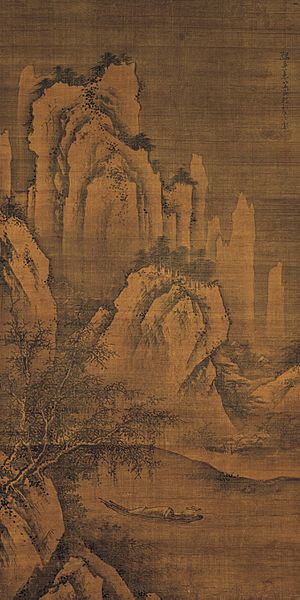Liu Zongyuan facts for kids
Quick facts for kids
Liu Zongyuan
|
|
|---|---|
 |
|
| Born | 773 Yongji, Shanxi
|
| Died | November 28, 819 (aged 45–46) |
| Liu Zongyuan | |||||||||||||||||||||||
|---|---|---|---|---|---|---|---|---|---|---|---|---|---|---|---|---|---|---|---|---|---|---|---|
| Chinese | 柳宗元 | ||||||||||||||||||||||
|
|||||||||||||||||||||||
| Alternative Chinese name | |||||||||||||||||||||||
| Chinese | 子厚 | ||||||||||||||||||||||
| Literal meaning | (courtesy name) | ||||||||||||||||||||||
|
|||||||||||||||||||||||
Liu Zongyuan (773–819) was a famous Chinese writer, politician, and poet. He lived during the Tang Dynasty, a very important time in Chinese history. Liu Zongyuan was born in a place called Yongji, Shanxi. He was one of the main people who started the Classical Prose Movement, which was a new way of writing. People often remember him as one of the "Eight Great Prose Masters of the Tang and Song" because his writing was so good.
Contents
About Liu Zongyuan
His Early Life
Liu Zongyuan was born in the year 773. His courtesy name, which was a special name given to adults in ancient China, was Zihou.
Working for the Government
Liu Zongyuan started his career working for the government, and he was quite successful at first. However, in 805, he lost favor with the government. This happened because he was connected to a group that tried to make some big changes, but their plans failed.
Because of this, he was sent away from the capital city. First, he was exiled to Yongzhou, Hunan. Later, he was sent even further away to Liuzhou, Guangxi. In Liuzhou, he became the city's Governor. Today, there is a park and a temple in Liuzhou that honor his memory.
Even though being exiled was difficult, it helped his writing career. During this time, he wrote many poems, fables, travel stories, and essays. His writings combined ideas from Confucianism, Taoism, and Buddhism.
His Death
Liu Zongyuan passed away in the year 819.
His Famous Works
Liu Zongyuan wrote many important pieces. His most famous travel writings are called the Eight Records of Excursions in Yongzhou. These stories describe his journeys and thoughts during his exile.
About 180 of his poems are still around today. Five of these poems are included in a well-known collection called the Three Hundred Tang Poems. Some of his poems celebrate his freedom from official duties. Others express his sadness about being sent away from home.
One of his most famous poems is "Jiangxue" (江雪). This title is often translated as "Winter Snow" or "River Snow." This poem has inspired many Chinese paintings over the years.
|
A thousand mountains, no sign of birds in flight; Ten thousand paths, no trace of human tracks. In a lone boat, an old man, in rain hat and straw raincoat, Fishing alone, in the cold river snow. |
Liu Zongyuan also wrote a critical essay called Fei Guoyu. In this work, he shared his thoughts and arguments against another book called Guoyu.
See also
 In Spanish: Liu Zongyuan para niños
In Spanish: Liu Zongyuan para niños
 | Stephanie Wilson |
 | Charles Bolden |
 | Ronald McNair |
 | Frederick D. Gregory |



